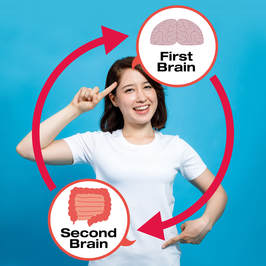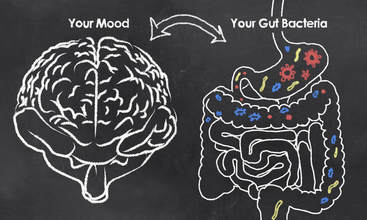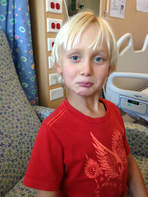|
This week, I am presenting several stories, or case studies of how food can impact the behavior of children.
The reason I'm talking about children is first because that's how I came to focus on the impact of food choices and second because the gut-brain connection is more obvious in children because they are less capable of filtering their what they're feeling.
I begin with my story, but be sure to scroll down to my interview with Matt Wright. It's interesting to here his story of how his childhood behavior issues were solved by food changes from his perspective as an adult.
A little bit about the gut-brain connection.
I'll go deeper into the gut-brain connection in a future blog post, but I want to provide some background for the stories I'm telling now.
The gut is being considered the second brain. It has more neurons than the brain and the spinal cord put together. Neurons communicate and transmit information throughout the body. It was thought that the brain controlled the action of the neurons in the body, but now we know that they are controlled in the gut as well. 
Neurons communicate with other nerve cells using neurotransmitters. There are twenty to thirty different transmitters located in the brain and also in the gut. Since the gut is the biggest sensory organ, it probably sends as many messages as the brain.
Neurons in the gut control the chemical and mechanical processes involved in digestion. Recently we've learned that 90% of serotonin, the happiness neurotransmitter is produced and stored in the gut. Seratonin also plays a role in sleep, mood, appetite, and pain sensitivity. The gut also produces four other main neurotransmitters found both in the brain and gut: GABA, Brain-derived neurotrophic factor (BDNF), Norepinephrine, and Dopamine. Bacteria create many of these neurotransmitters, so it follows that if gut health is subpar, then seemingly brain related disorders may originate in the gut. For example, 66% of the people diagnosed with IBS (irritable bowel syndrome) also have mood disorders, i.e. depression and/or anxiety. Note: this is a relatively new and rapidly increasing area of study, so some of what I'm offering is as "food for thought." More and more conclusive evidence from studies is being published all the time. I will also write more about IBS in a later post. For now, I want to share my story and also a similar story I share in an interview with Matt Wright, who also had behavioral issues turned around by diet.
Although I know it most likely doesn't fit for every child with behavioral issues, I often think of a child that is consistently misbehaving, despite a pretty good family and living situation, as having an irritated nervous system, which often originates in the gut.
Extrapolate that to adults with anxiety, depression, or irritability and it makes sense that something may be off in our gut. How it all started for me...
As some of you know, while I've always been interested in health and nutrition, I became hyper-focused when my son was recovering from osteomyelitis, which is a bone infection. In his case, it was a staph infection in his femur.
He was diagnosed with osteomyelitis five days after he started experiencing flu-like symptoms while at summer day camp. We had taken him to his regular doctor after two days, the emergency room the next day, and then when the emergency room physician got his blood test results back the next day, she sent us to Stanford Hospital, which is the big teaching hospital in our area and is also connected to Lucille Packard Children's Hospital. This is where we ended up after we were finally admitted about twelve hours after we arrived at the emergency department.
 Still cheeky! Still cheeky!
Happily, the treatment procedure for osteomyelitis is routine these days. He was started on antibiotics intravenously as soon as he was diagnosed. That lasted for several days until they had to reinsert the IV and my little guy said no way and made it impossible. Then he was switched to oral antibiotics and released after one more day when his inflammation markers had come down considerably.
We were grateful for the antibiotics, it certainly was an appropriate use for them!
We were happy to go home. It's hard to get any sleep in a hospital. The children's hospital does have beds in the rooms for parents, but I ended up sleeping in the chair next to his bed because it felt weird to me to sleep through anything the nurses needed to do with him during the night.
It also felt strange to be on my own, when I had been so worried about him, and he had lost leg strength in so short a time. I probably hovered quite a bit, especially as we have a lot of stairs in our home.
His course of heavy duty antibiotics lasted a month.
He started first grade about a week and a half after he came home from the hospital. I had to go to his school to give him one of the doses of antibiotics each day. Also, he wasn't allowed to play on the playground or participate in what his school called games class, because the bone where the infection was could be spongy or easily damaged if he bumped it. Not a good start to grade school for him!
He hung in there, though. He sure was happy when his blood test showed that the inflammation markers had stayed down, and he was told he could return to regular activity and be finished with the antibiotics.
This is where it became even more interesting.
Very soon after my little guy stopped taking the antibiotics, he started having behavior problems at school. The behavior problems became quite severe, very quickly. He became very reactive, was in fight or flight mode much of the time, and certainly wasn't able to sit at a desk for very long or listen to his teacher.
Not only was he disruptive in the classroom, but he would even run from the classroom and hide. Even when sent to his old kindergarten teacher, with which he had a terrific relationship, he wouldn't respond. It was a nightmare for everyone involved.
I don't remember making any connection to the antibiotics for quite some time, although I had been giving him probiotics beginning when he started on antibiotics. I considered pulling him out of school to homeschool him, but thought it would be better for him to stay at his sweet Waldorf (Steiner) School. He'd been there for nearly three years with pre-K and Kindergarten. His older sister was beginning her fifth year.
I considered that maybe he'd been traumatized by his hospital stay. There had been a lot of poking and prodding, especially the first night while we were waiting to be admitted and he was still in so much pain. So I decided to take him to a well known play therapist in our area, first once a week, then we upped it to twice a week.
While I did decide to keep him in school, we reduced his hours to two morning hours per day. Because I was so focused on alternative therapies, I also took him to a friend of ours who is an osteopathic doctor, thinking he may be out of alignment because of the infection in his leg. She also gave him a homeopathic remedy. I even decided to self study the Bach flower remedies. Somewhere during that time we also took him to a doctor three and a half hours away, who was a specialist in treating children with behavioral disorders and had spoken at our school several times.
Before you jump to the conclusion that I'm completely crazy, I will tell you that the traditional medical establishment didn't have any answers, other than at some point suggesting he be tested for ADD or ADHD. It's always the last thing you try that works.
We were in this situation for about five months. There was some improvement, just not enough.
Sometime in February, he changed schools. His Waldorf teacher still wasn't ready for him to be there full time, but our therapist agreed that psychologically he needed to either be there full time or not at all. So we decided to try our local elementary school. Changing schools helped a little. He had a more compassionate teacher. Still, though, he was having problems. After about another month, I somehow came across a diet called the Feingold Diet. Taken from their website "The Feingold Program is a form of elimination diet where foods containing certain harmful additives are removed and replaced with similar foods that are free of those additives. When starting the Program, certain foods and non-food items containing an aspirin-like chemical called salicylate are also eliminated, and later tested for tolerance."
I don't remember why I thought it would help, but I certainly figured it couldn't hurt.
Within a few weeks, we could already see a difference, the main one being that he stopped chewing on the front of his shirt. Slowly his behavior also improved. To be honest, we were so happy that he was doing so much better that even though we could have tried reintroducing some of the salicylate foods after about four weeks, we just didn't want to. We didn't want any chance of the poor behavior returning. I'll note here that I also decided that I would take gluten out of his diet as well when I started the Feingold diet.
We didn't have any of the foods that he couldn't have in our home. I decided that I would follow the same food program with him since I was the one making him do it. The rest of the family was free to eat foods not on the plan when they were out and about without him. Keep in mind that the foods containing natural salicylate are generally good for you. The foods he couldn't have included berries, apples, stone fruits, and many of the nightshades. My take on it now is that the salicylate probably reduces inflammation in the body unless you have gut health problems.
I definitely noticed a difference in my son, but then I noticed a difference in myself. After several months of following along with my son's food program, I had lost about ten pound that I just figured was middle-aged, post-baby weight. I also found that I wasn't feeling anxious as I had been inexplicably for several years.
I was amazed at the behavioral change in my son and the changes I felt myself and so then I wanted to know why it worked. I should also say that it wasn't like our family went from eating junk food to having a clean diet. We ate pretty well to begin with.
That's why I decided to enroll that fall in the Institute of Integrative Nutrition health coaching program. I never planned on becoming a health coach (or consultant), I just wanted to learn more about how diet could effect everything else in your life.
Matt Wright's story of how allergy testing made a difference in his childhood.
Recently, a friend of mine introduced me to Matt Wright (online) after hearing my story and noticing the similarities. I thought it would be fun to interview him since he has an adult perspective on eliminating foods when he was a child.
Matt had behavior problems as a child and it wasn't until his third grade teacher suggested he be tested for food allergies, that he and his parents were able to help him with his behavior. The way I understand it, is if a child's nervous system is irritated and they aren't mature enough to know how they are supposed to act, then they will often act out. Just think about how my son stopped chewing on his shirt when we removed the offending foods. When looked at from that point of view, you can have more compassion for the child and the parents. It's not necessarily something they are or aren't doing that is causing their child to behave a certain way. The same symptoms of an irritated nervous system in an adult could cause anxiety, irritability, or depression.
Watch the interview below. Learn how Matt's behavior problems were turned around and about how it's impacting his life and choices now.
I've also bought a pair of blue light blocking, anti-glare glasses to wear while I'm working on the computer. They do seem to help my sleep and keep my eyes from becoming as tired since I'm spending more time on the computer than I used to.
Next week I'll be going into depth on the differences between food allergies, intolerances, and sensitivities. I will also discuss the pros and cons of elimination diets and testing for sensitivities.
What is your take on food, gut health, and mood? Please share your in the comments below!
|
Click below to join my FREE Facebook Group-
Women's Wellness Circle: Create Your Extraordinary Life AuthorHi, I’m Crystal! If you'd like to access my Farmer's Market Friday posts from 2018, click here!
Categories
All
|



 RSS Feed
RSS Feed